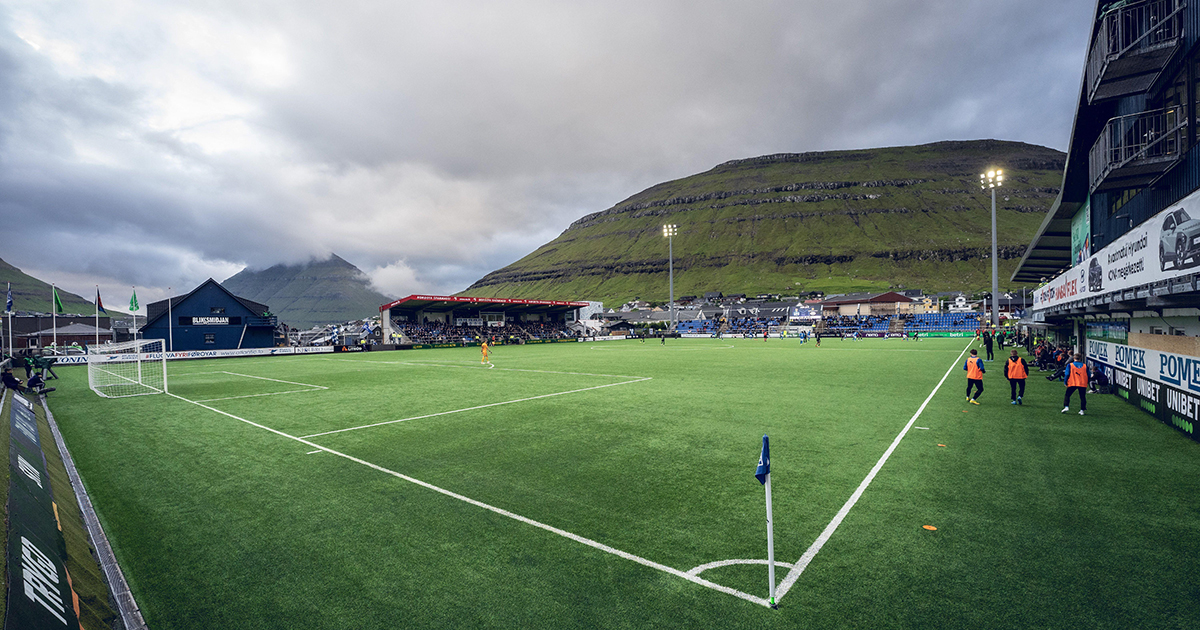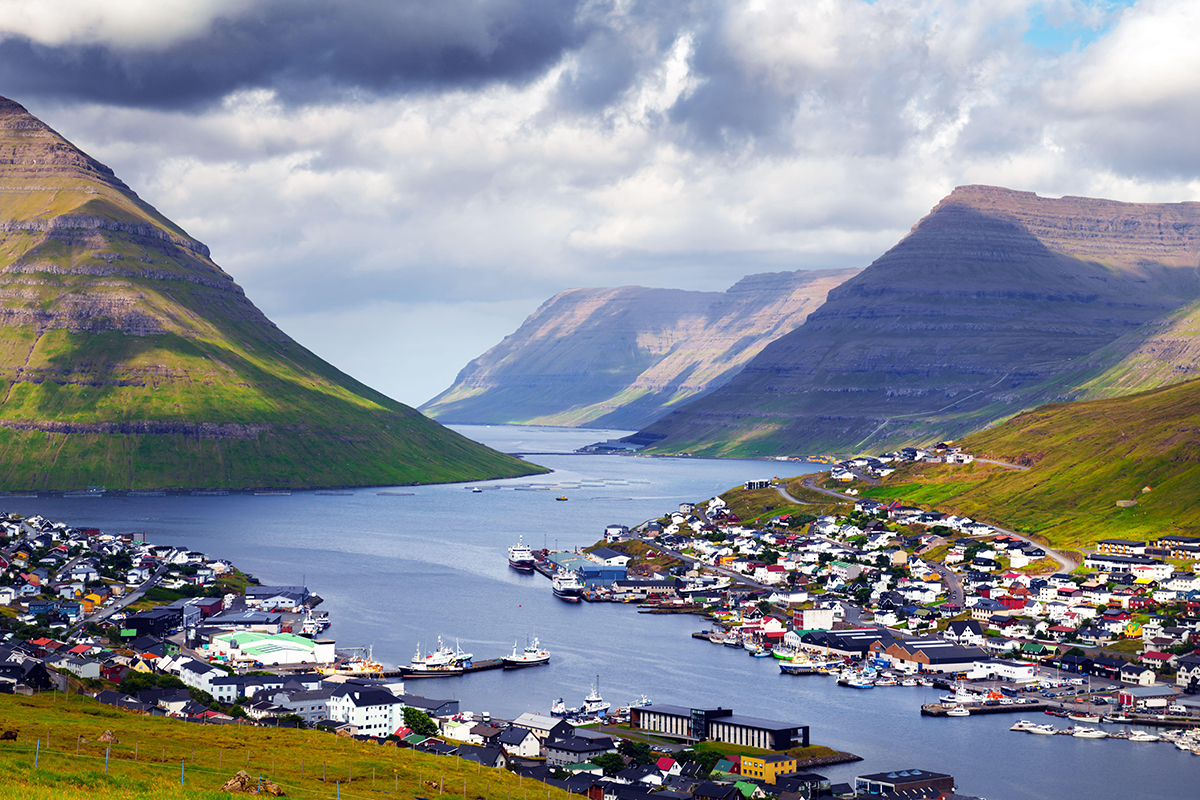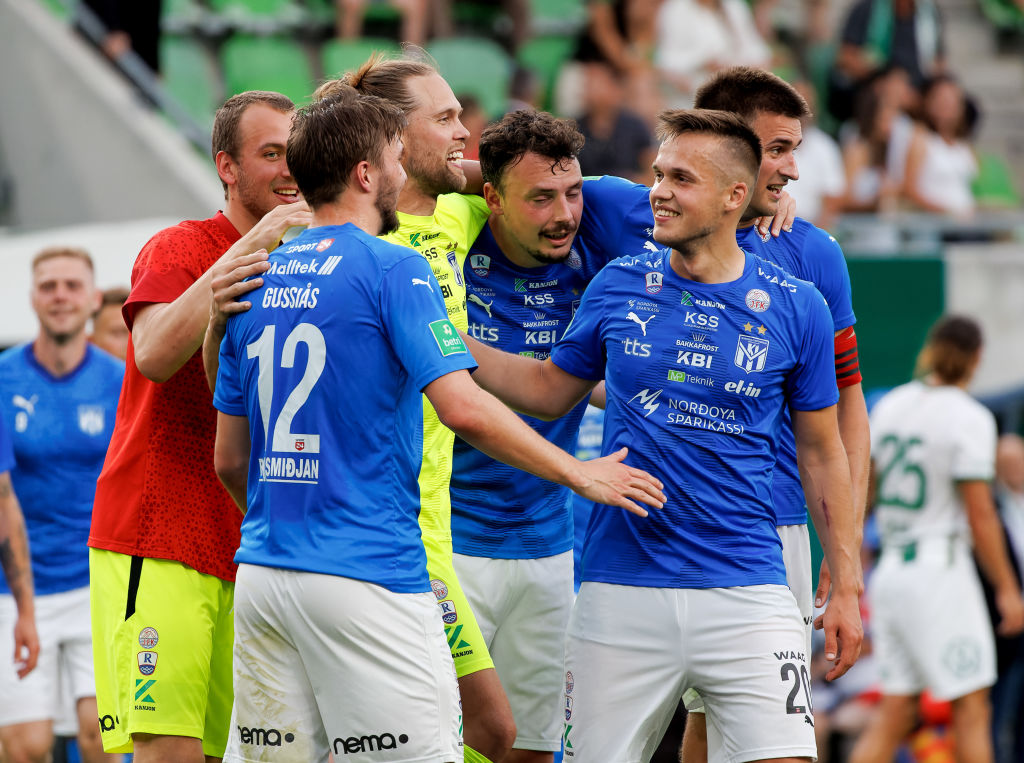
The time was nearly 10pm in the tiny Faroese town of Klaksvik, and the light was starting to fade beside the fjord, as hundreds lined the streets to welcome home their heroes.
A day earlier, Klaksvikar Itrottarfelag - Klaksvik Sports Club, commonly known as KI - had won 3-0 at Ferencvaros in the first qualifying round of the Champions League, eliminating the Hungarians, to register arguably the finest club result in the history of the Faroe Islands. Now, after arriving back at Vagar Airport, on one of the most westerly of the Danish colony's 18 islands, the team bus had travelled an hour east, nearly the entire breadth of the Faroes, navigating the various tunnels that cross its waterways, to make it back home.
To them, home is a town of just 5,000 people, in a tiny valley perched between two fjords, on the island of Bordoy. It's the Faroes' second biggest settlement, behind capital Torshavn, but it's never been renowned as one of Europe's greatest footballing powerhouses.
As the bus trundled back into town though, while FFT watched at the roadside, it was clear that the community of Klaksvik had been unified by the beautiful game. Near enough half of the town had gathered - some lit flares, some set off fireworks, others merely cheered and applauded enthusiastically. A lorry driver had parked by the roundabout, to blare his horn in approval as the bus went past. Even in July, fully 11 months before the final of the Champions League at Wembley on June 1, the competition had already produced one of the season's most heart-warming moments.
It doesn't matter how big or small your team may be, success can create memories that last a lifetime. As players got off the bus, small children eagerly raced across the road towards them, to get autographs, or merely just to say hello. In 50 years, those kids will probably still treasure that moment.

KI's victory over Ferencvaros was another step along the road to giving the Faroe Islands a footballing credibility they never used to have. "Daft little ground, silly game, f*** off," was Richard Keys' disparaging verdict when the Faroes took on Scotland in a qualifier for Euro 2008 - the off-air tape was one of several leaked during his downfall at Sky Sports.
That match was played at the Svangaskard Stadium, a hilltop venue of roofless stands in Toftir. The location was pretty, but it wasn't exactly luxury, even if Keys' comments were unnecessarily condescending.
Since then, much has changed. The national team's main home, Torshavn's Torsvollur, has been renovated into a really quite smart 6,500-capacity venue that would put plenty of League One grounds to shame, with plush executive boxes on two sides. Curiously, it co-exists right next to another 5,000 stadium, home to the capital's two leading clubs, HB and B36. On one side of that ground, each club has their own main stand, both right next to each other, both with their own dressing rooms and dugouts, such is the reluctance presumably to share each other's facilities.

It doesn't seem the most economical way to do things, but grudges must be strong in Torshavn - a name that translates as 'Thor's Harbour' and was the venue of controversy recently, when almost a hundred whales were slaughtered in front of horrified cruise ship visitors. Hunting remains part of the tradition of the Faroes.
Situated 270 miles south of Iceland in the middle of the North Atlantic Ocean, with hilly terrain akin to the Lake District or parts of Scotland, the Faroe Islands tried to follow Iceland by becoming independent from Denmark in 1946, shortly after the British had occupied the area during World War Two, in a bid to prevent Germany from seizing control.
Perhaps in deference to that connection, Faroese radio was randomly playing New Order's World In Motion on our own bus journey to Klaksvik. Is a rapping John Barnes all the rage in the Faroes? Are they just aficionados of Bobby Robson's Italia 90 icons? We may never know. Either way, the Faroes' 1946 independence vote didn't get very far - the Danes annulled the result, although the islands were granted enough autonomy to allow them to later join FIFA, in 1988.
Any sort of success was few and far between during their first two-and-a-half decades - in 2015 though, they surprisingly beat Greece at the Torsvollur, their second victory over the former European champions in a matter of months. Their first victory in Piraeus had put Claudio Ranieri out of a job - sacked by Greece, he became Leicester boss instead and ended up winning the Premier League. Just last year, the Faroes also beat Turkey in Torshavn in the Nations League.
Like the Torsvollur, Klaksvik's 2,500-capacity home ground, surrounded by hills on both sides, has similarly been upgraded to UEFA standards - not only did it host KI's 0-0 first-leg draw with Ferencvaros, before their heroics in Budapest, but FFT were also primarily in town on a summer break to witness it stage Thursday's Europa Conference League clash between Vikingur Gota and Andorran club Inter Club d'Escaldes.

In what seemed like a perennial squall that swirled around Klaksvik during our visit - temperatures were only 10 degrees in mid-summer - 678 spectators turned up to watch. Vikingur, from a settlement of only 650 people on the next island, thought they'd taken the tie to extra time when they dramatically fired home in the 96th minute, only for a controversial linesman's flag to seal their exit. That prompted bad-tempered scenes between both sets of players at the final whistle, at the end of a tetchy match interrupted by a more light-hearted moment when a wayward shot cleared the fence behind one goal and thudded into the front door of a nearby house.
Quality was in short supply in that fixture - Faroese champions KI are clearly more talented, illustrated by the way they caught Ferencvaros off guard in Champions League qualifying, taking the lead with a penalty in Budapest, before the match spiralled away from the panic-stricken Hungarians. "A bunch of heroes," is how KI's Norwegian boss Magne Hoseth described his players. "It's huge for us - the attention is deserved."
The club have another Norwegian in their ranks too, former Southampton and Brighton defender Vegard Forren, and have dominated the last three Faroese Premier League seasons. They didn't lose a game during the 2022 campaign, which ran from March to October, and went into the Ferencvaros tie having won all 16 of their league matches so far this term, seeking to become the first top-flight men's team to win every match of a league season since Sunrise Flacq United of Mauritius in 1996.
Three years ago, they were just one tie away from becoming the first Faroese club ever to make the group stage of a European competition. They'd been fortunate to get a walkover against Slovan Bratislava in Champions League qualifying when one of the squad that travelled to Klaksvik got COVID and the Slovakians were forced to pull out, then KI lost to Young Boys, but thrashed Dinamo Tbilisi 6-1 after dropping into Europa League qualifying. In the end, defeat to Dundalk in the play-off round narrowly denied them a spot in the group stage.
Welcome back in town🇫🇴🔵⚪ @KI_Klaksvik @magnehoseth pic.twitter.com/GBJF0xGeZJJuly 20, 2023
This week, when they face BK Hacken in the home leg of the Champions League's second qualifying round, their group stage dream is very much alive again. According to UEFA rankings at least, they're actually favourites to beat the Swedish champions - they'd need to win two more rounds after that to reach the Champions League group stage, which looks unlikely, but could otherwise drop down to Europa League qualifying, and then potentially the Conference League. If they beat Hacken, they're guaranteed a place in the Conference League group phase at the very worst.
That would be history for Faroese football, and another moment to savour forever for the tight-knit community of Klaksvik. Sadly, Richard Keys probably still wouldn't be impressed.







